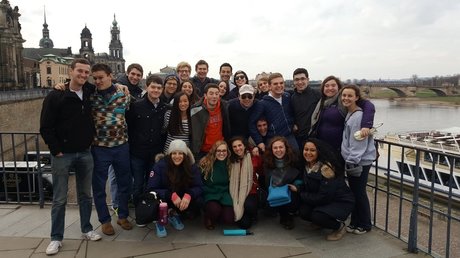 Unlike many of my peers on our Alternative Spring Break trip to Berlin, I didn’t have many personal connections to Germany or even the Holocaust. All of my grandparents were born and raised safely in the United States by the time World War II came, so thinking about the Holocaust has always been one-step removed. I have also been fortunate enough to spend time on other trips diving deeper into Holocaust education and remembrance, including a week in Poland touring Auschwitz and the other infamous death camps. Because of all of this, my experience in Berlin was perhaps different than someone who lost a relative during the Holocaust or who had never previously come into physical contact with relics of the atrocity that occurred. Maybe I thought I would feel more distant from the history, but leaving Germany, I could not have felt more differently. If you glimpse at the past hundred years of German history, you’re immediately forced to grapple with stark changes in national identity. After WWI, Germany was meeting modernity, yet unsure of what it meant to be German. During WWII, Germany had a narrow definition of its national identity and sought to persecute all who did not fit within it. After WWII, Germany was split and forced into two vastly different schools of politics and thought. And finally, after reunification, about 5 years before I was born, Germany was given a bunch of broken pieces and a goal for a modern Western democracy. Coming into contact with all of these points of identity change forced me to think about how volatile identity is in the world we live in. As humans, we seek continuity, especially in our identities, so I empathized with how Germans and especially German Jews were forced to continually readdress their own identities as the history of the world marched forward. Just as German identity has continued to shift over time, I have realized that Jewish identity, too, must continually be reflected upon and not merely something taken for granted. Identity isn’t static, it responds to the experiences around us and transforms as we process the people, places, and things with which we come into contact. Although I didn’t expect it, I think I was one of many students whose understanding of my Jewish identity evolved over the course of my time in Berlin. Throughout my life, I have come into contact with various Jewish communities, studied and socialized in different schools, and have participated as a citizen in many different political climates. With each change, I am forced to recapitulate what being Jewish means in the here and now that I experience. For one German Jew, every decade, every year brought new challenges and opportunities for understanding national and religious identity. While in Germany, I was forced to reflect upon my role as a citizen, as a member of a faith community, and as someone who has one foot in each community: the secular and the religious. I was reminded of all of the Jewish people who, over the past hundred years, have sustained themselves through the tumultuous history of the world and have adapted to make sense of it all. So perhaps I did not arrive to Germany with an immediate connection to the narrative shared with us, but it did not take long for me to understand the volatile history of identity transformation in the country and how I was far from immune from that process of transformation, as well. -- Michaela Brown Class of 2017 Comments are closed.
|
The Brody Jewish Center, Hillel at the University of Virginia, is the focal point in a renaissance of Jewish life for the 1,000 Jewish students on Grounds. Archives
September 2021
Categories
All
|
 RSS Feed
RSS Feed